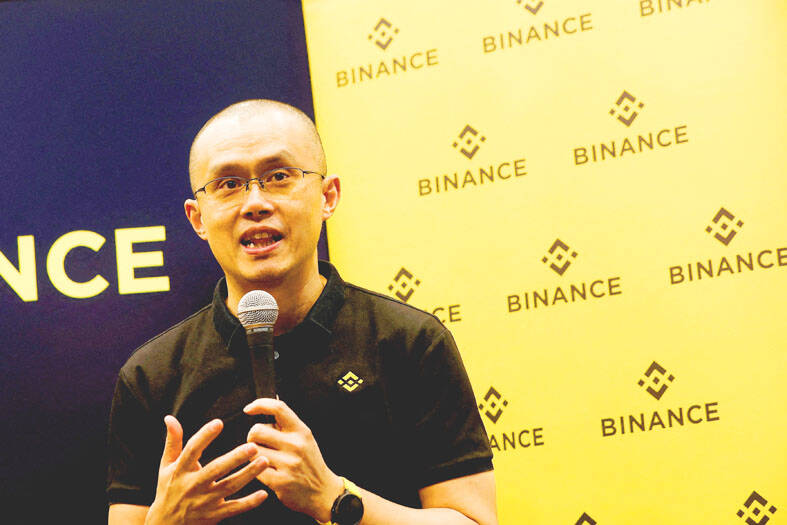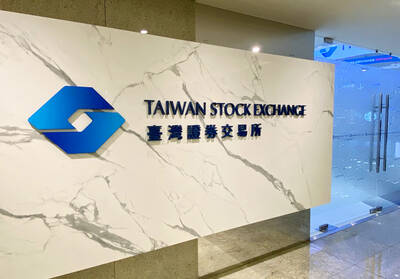The US on Monday took its most forceful move yet to crack down on crypto exchange Binance Holdings Ltd (幣安控股) and its CEO, Zhao Changpeng (趙長鵬).
The US Commodity Futures Trading Commission (CFTC) alleged in federal court in Chicago that Binance and Zhao, who is known as CZ, routinely broke US derivatives rules as the firm grew to be the world’s largest trading platform.
Binance should have registered with the agency years ago and continues to contravene the CFTC’s rules, the regulator said.

Photo: Reuters
“The defendants’ own e-mails and chats reflect that Binance’s compliance efforts have been a sham, and Binance deliberately chose — over and over — to place profits over following the law,” said Gretchen Lowe, chief counsel in the CFTC’s enforcement division.
The CFTC’s lawsuit was “unexpected and disappointing,” Binance said in a statement.
The exchange said that it had been working with the regulator for more than two years and would continue to collaborate with authorities in the US and elsewhere.
“We have made significant investments over the past two years to ensure we do not have US users active on our platform,” Binance said.
The company added that it has expanded its compliance team, spent heavily on bolstering surveillance and taken significant actions to prevent Americans from using its global trading platform.
In a statement on the Binance Blog, Zhao said the CFTC’s complaint “appears to contain an incomplete recitation of facts, and we do not agree with the characterization of many of the issues alleged in the complaint.”
He added that he strictly observes Binance’s policies, including those for anyone with private information, such as details on listings.
The CFTC is a civil government agency, so it cannot bring criminal charges against firms or seek jail time for individuals.
However, cases from the regulator can result in hefty fines and other penalties against companies and individuals.
In addition to suing Zhao and several Binance entities, the CFTC also alleged that Samuel Lim, Binance’s former chief compliance officer, broke its rules.
The agency said that Zhao, Lim and other senior managers failed to properly supervise Binance’s activities and took steps to contravene US laws, including instructing US customers to use virtual private networks to obscure their location and directing “VIP customers” with US ties — often institutional market participants — to open Binance accounts under the names of shell companies.
The CFTC alleged that Binance failed to implement an effective anti-money laundering program.
It also did not establish necessary safeguards for determining the true identity of customers, the agency said.
The complaint says that as of at least May last year, Binance had not filed a single suspicious activity report in the US.
The CFTC also said Binance’s own documents for the month of August 2020 showed that the platform earned US$63 million in fees from derivatives transactions, and that about 16 percent of its accounts were identified as being held by US customers.
“Defendants have disregarded applicable federal laws while fostering Binance’s US customer base because it has been profitable for them to do so,” the CFTC said in its complaint.
The company intentionally destroyed documents and makes frequent use of the encrypted messaging app Signal to communicate with US customers, at Zhao’s instruction, the agency said.

Taiwan Semiconductor Manufacturing Co (TSMC, 台積電) secured a record 70.2 percent share of the global foundry business in the second quarter, up from 67.6 percent the previous quarter, and continued widening its lead over second-placed Samsung Electronics Co, TrendForce Corp (集邦科技) said on Monday. TSMC posted US$30.24 billion in sales in the April-to-June period, up 18.5 percent from the previous quarter, driven by major smartphone customers entering their ramp-up cycle and robust demand for artificial intelligence chips, laptops and PCs, which boosted wafer shipments and average selling prices, TrendForce said in a report. Samsung’s sales also grew in the second quarter, up

LIMITED IMPACT: Investor confidence was likely sustained by its relatively small exposure to the Chinese market, as only less advanced chips are made in Nanjing Taiwan Semiconductor Manufacturing Co (TSMC, 台積電) saw its stock price close steady yesterday in a sign that the loss of the validated end user (VEU) status for its Nanjing, China, fab should have a mild impact on the world’s biggest contract chipmaker financially and technologically. Media reports about the waiver loss sent TSMC down 1.29 percent during the early trading session yesterday, but the stock soon regained strength and ended at NT$1,160, unchanged from Tuesday. Investors’ confidence in TSMC was likely built on its relatively small exposure to the Chinese market, as Chinese customers contributed about 9 percent to TSMC’s revenue last

Taiwan and Japan will kick off a series of cross border listings of exchange-traded funds (ETFs) this month, a milestone for the internationalization of the local ETF market, the Taiwan Stock Exchange (TWSE) said Wednesday. In a statement, the TWSE said the cross border ETF listings between Taiwan and Japan are expected to boost the local capital market’s visibility internationally and serve as a key for Taiwan becoming an asset management hub in the region. An ETF, a pooled investment security that is traded like an individual stock, can be tracked from the price of a single stock to a large and

Despite global geopolitical uncertainties and macroeconomic volatility, DBS Bank Taiwan (星展台灣) yesterday reported that its first-half revenue rose 10 percent year-on-year to a record NT$16.5 billion (US$537.8 million), while net profit surged 65 percent to an unprecedented NT$4.4 billion. The nation’s largest foreign bank made the announcement on the second anniversary of its integration with Citibank Taiwan Ltd’s (花旗台灣) consumer banking business. “Taiwan is a key market for DBS. Over the years, we have consistently demonstrated our commitment to deepening our presence in Taiwan, not only via continued investment to support franchise growth, but also through a series of bolt-on acquisitions,” DBS